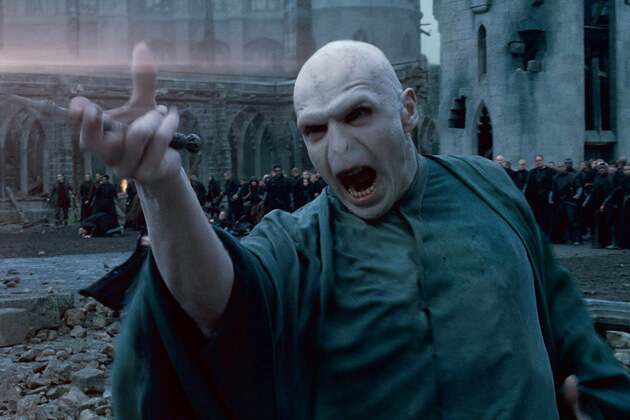Today we are going to talk about the greatest villains in literature.
It has been said that Randall Flagg (originally from Stephen King’s The Stand and then appearing in eight more of his books) is the greatest villain of all time.
He certainly is one of the most scary. I read The Stand for the first time while Mr. D and I were traveling in Paris for our 10-year-anniversary.
Let’s just say, Flagg combined with jet lag made for many sleepless nights.
I also would add Voldemort, Count Dracula, Professor Moriarty, Cruella deVille, Satan in Paradise Lost, Norman Bates, and Hannibal Lecter.
More of the Greatest Villains of All Time
I crowdsourced this topic on on my personal Facebook page a couple of years ago and thought it’d be fun to come back to it.
Here is what some of my (crazy) friends have said are the greatest villains in literature.
- Roger Chillingworth in The Scarlet Letter. His psychology is so richly layered. Hawthorne shows Roger is inherently good, but the temptation of revenge consumes him completely. He is smart, eerily calm, and deeply manipulative. Like a leech depending on its host for sustenance, Chillingworth drains vitality from his enemy, Arthur, and depends on the pursuit of vengeance to fulfill him. Totally creepy, but sad, too. – Jono Smith
- Professor James Moriarty in Sherlock Holmes. Just because he was so good. A burr under Sherlock Holmes’ saddle. – Chris Reimer
- Patrick Bateman in American Psycho. I choose Patrick Bateman because any one of us could be him (and please–from the book, not the movie). Bateman is completely banal, and represents what could happen to any of us, really, if we cannot make meaning in our lives. – Tom Webster
- Lord Walder Frey in Game of Thrones. My money is on Walder Frey because his list of crimes is most impressive…incest, violation of the “guest” rule, murder, treason, regicide, need I go on? He’s so well written, you literally feel like you need a shower just reading about him. – Rosemary O’Neill
- Man in Bambi. Every villainous act is an act of man. Bambi just exemplifies it. The villain doesn’t need to be a character per se. When you break down any work, the antagonist is a human with human flaws and failings that we can all identify within ourselves, only magnified to the unthinkable point of no return. So in this way, we are all the villain by human nature. – Raymond Konkoleski
- The Firemen in Fahrenheit 451. First they can destroy all other literary villains just by burning them, and second, they destroy knowledge forever which I think is the most evil thing one can do. – Pascale Bishop
- O’Brien in 1984. He is someone who believes to seek freedom of thought and opinion is insane. He is willing to torture Winston Smith and we never learn enough about him to have our questions answered. – Bob LeDrew
- Anton Chigurh in No Country for Old Men. A ruthless emotionless hitman who occasionally flips a coin to determine someone’s fate. – Darryl Robinson-Keys
- Fernand Mondego in The Count of Monte Cristo. Mondego used a fairly complex series of lies, collusions, etc, to achieve his goals. And was without any semblance of remorse. In fact, he reveled in his cleverness. – Marty Thompson
- Count Olaf in the Series of Unfortunate Events. He is cruel, lazy, and works through subterfuge to turn others against the orphans. He takes away all sense of comfort, leaving them forever on the run with no place to call home. Each time they think they’ve achieved it, he swoops in and takes it away. – Mickey Gomez
- Big Nurse in One Flew Over the Cuckoo’s Nest. Granted, much of her characterization comes through the eyes of a paranoid Chief Bromden, but she represents absolute and unwavering authority to the patients. Her battle of wills with McMurphy is about controlling joy — and snuffing it out. She’s cold, calculating, and domineering. McMurphy’s rebellion against the Combine can’t stand, and she puts an end to all he is — and more. – Jason Konopinski
- Professor Umbridge in Harry Potter. She is the worst kind of person: Small-minded, cruel, cat-lover, and effective–very scary. – Keena Kincaid. And Mickey adds, “Umbridge is far more evil than Voldemort. She revels in petty cruelties and is willing to cross any number of lines in her thirst for power over others. Umbridge is everything evil about the facelessness and heartlessness of bureaucracy. Think about how delighted she was to turn Professor Trelawney out of Hogwarts, or how she immediately punished Harry in a way far beyond that of acceptable discipline, or her willingness to use an Unforgiveable Curse out of “necessity” (illegal for others but not her). Her subsequent rise to lead an office created solely to eradicate Half-Bloods smacked of genocide. And she loved it.”
- President Snow in The Hunger Games. Cold, calculating, cowardly. perfect. – Rusty Speidel
- Time. Time is a betty big villain in most stories. There is never enough (just ask Jack Bauer), and when you really need more what does time do? That’s right, abandon you. – Brian Tudor
Add Your Villain
And now it’s your turn.
If you don’t see your villain listed here, tell us in the comments who it is and why.
The only rules are the villain has to be from literature (not a movie or comic books) and there has to be a reason why.
We’ll add to the list and keep a big tally of the greatest villains of all time.
